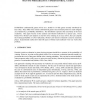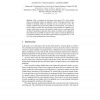104
click to vote
ACG
2006
Springer
15 years 5 months ago
2006
Springer
Amazons is a two-player perfect information game with a high branching factor, particularly in the opening. Therefore, improving the efficiency of the search is important for impro...
101
click to vote
ACG
2006
Springer
15 years 8 months ago
2006
Springer
Probabilistic combinatorial games (PCG) are a model for Go-like games recently introduced by Ken Chen. They differ from normal combinatorial games since terminal position in each ...
ACG
2006
Springer
15 years 8 months ago
2006
Springer
Seki is a situation of coexistence in the game of Go, where neither player can profitably capture the opponent’s stones. This paper presents a new method for deciding whether an...
100
click to vote
ACG
2006
Springer
15 years 8 months ago
2006
Springer
First, this paper introduces a new family of k-in-a-row games, Connect(m, n, k, p, q). In Connect(m, n, k, p, q), two players alternately place p stones on an m × n board in each ...
116
click to vote
ACG
2006
Springer
15 years 8 months ago
2006
Springer
A method to simulate the physics of the game of pool is presented. The method is based upon a parametrization of ball motion which allows the time of occurrence of events, such as...
103
click to vote
ACG
2006
Springer
15 years 8 months ago
2006
Springer
Most game programs have a large number of parameters that are crucial for their performance. Tuning these parameters by hand is rather difficult. Therefore automatic optimization a...
ACG
2006
Springer
15 years 8 months ago
2006
Springer
ACG
2006
Springer
15 years 8 months ago
2006
Springer
A plethora of enhancements are available to be used together with the αβ search algorithm. There are so many, that their selection and implementation is a non-trivial task, even ...
ACG
2006
Springer
15 years 8 months ago
2006
Springer
Abstract. This paper presents a Phantom Go program. It is based on a MonteCarlo approach. The program plays Phantom Go at an intermediate level.
117
click to vote
ACG
2006
Springer
15 years 8 months ago
2006
Springer
Abstract. Progressive Pruning (PP) is used in the Monte-Carlo go playing program Indigo. For each candidate move, PP launches random games starting with this move. PP gathers stati...


